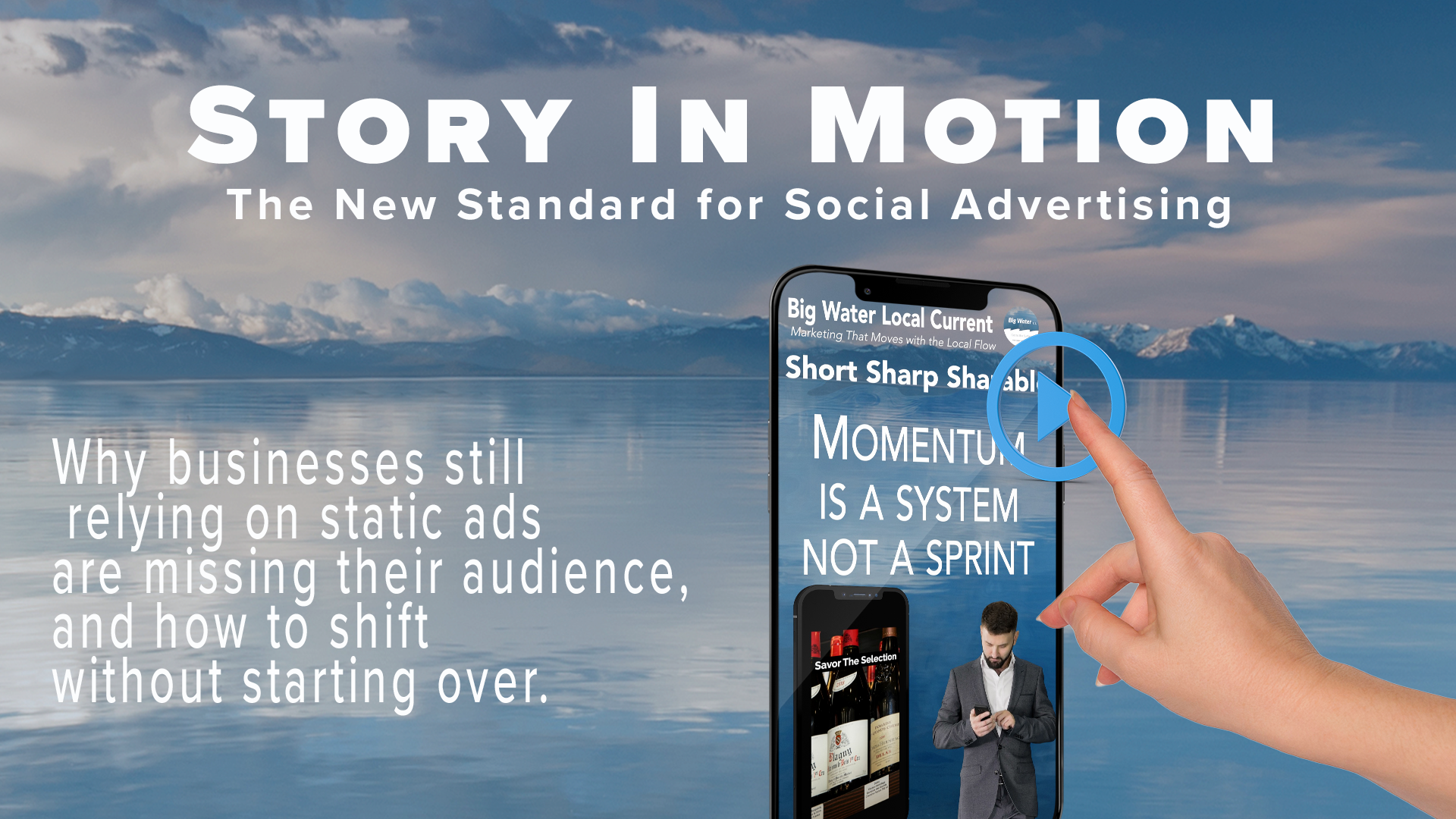
Most of the clients I work with still spend the majority of their ad budget on Meta platforms. And for good reason: it’s where their audience is, where targeting is strong, and where they’ve seen results for years. YouTube is a close second, depending on the business.
But in the last 18 months, something has changed. Not the platform. Not the audience. The format.
If you’re still running static image ads expecting the same results you saw in 2022 or even early 2023, you’ve probably already noticed:
And it’s not because your business is doing anything wrong. It’s because social media itself has shifted.
Scroll any social platform today—Meta included—and you’ll see it right away:
👉 Reels
👉 Stories
👉 Shorts
👉 TikToks
These short-form, motion-first formats are now where the attention lives. Even if your audience is still on Facebook or Instagram, they are not engaging with content the same way they did even a year ago.
When static ads show up in a short-form feed, they land like a mosquito on your screen. You don’t even think; you swat. It’s a reflex. It’s interruptive. So if your ad doesn’t move, it may not have the desired results.
That’s a problem—especially if your audience is still active, just not interacting.
This shift isn’t theoretical. It’s visible in performance. We’re seeing static placements stall while video content (especially native, story-based video) is outperforming across industries.
Here’s what’s delivering results right now across platforms;
✅ Short videos that feel like they belong in the feed
✅ Human presence: face-to-camera, voiceovers, and candid shots
✅ Single-message storytelling: quick, clear, and emotionally tuned
✅ Content that’s native to the platform (not overly produced or overly polished)
In other words, your audience doesn’t want another graphic. They want something that feels like a moment.
Something that moves.
This isn’t about canceling static content altogether. It’s about acknowledging where it's no longer leading your strategy.
In a motion-based environment, static graphics are no longer enough to carry your message.
Think of it this way: If your audience is walking down a street full of video screens—and your message is printed on a flyer taped to a pole—you might still reach a few people. But not many are stopping.
That’s what’s happening when you rely on static ads inside a video-first feed.
Here’s the good news: You don’t have to throw everything out and start from scratch. The strategy now is about repurposing with intention. Here is where AI can really help. Most people want to put in too much information. Use AI to take ONE simple message and turn it into a 30-second video script. Remember, you are entering THIER feed. Trying to pack it all in is not efficient; it’s annoying. The swipe becomes a swat.
Take your best-performing messages and turn them into short-form video ads that feel:
Sometimes it’s as simple as turning a great testimonial into a 20-second voiceover with motion. Sometimes it’s you or your team showing up and speaking clearly about what you offer. Sometimes it’s using B-roll or product shots you already have and crafting a narrative around them.
The key is to deliver your message in motion.
If you’re ready to adjust, here’s where to start:
It’s not about being perfect. In fact, people love to see you grow and get better. They love the social credit of watching you and your message mature.
Every new client I put in front of the camera, I give the same advice: “ The first ten suck, get them over with.”
People love watching you grow. They like seeing the message evolve. And the more videos you create, the faster those early ones get pushed to the back of the feed.
This isn’t about perfection, it's about production. It’s about being present in the format your audience now expects.
It’s tempting to blame the platform when ad performance dips. But what we’re seeing again and again is this:
The audience hasn’t disappeared. They’re still there. They’re just consuming differently.
If your Meta ads aren’t performing like they used to, don’t assume the platform is broken. Before you shift your budget, shift your format.
And it’s not just Meta. YouTube, TikTok, Snapchat, and even LinkedIn have gone video-first. There are a few static placements left, and they’re not where attention lives anymore.
At the same time, Google and traditional search are shifting towards AI-powered results. That’s the second major wave. Search behavior is evolving just as fast as social feeds.
If you're not adapting to both, you're falling behind.
Want help with the shifts? Check out:
Because the shift is complete.
Social is video. Search is AI. The feed moves fast—and your brand has to move with it.
If there is a topic you’d like to hear more about, by all means comment below or direct message, and I’ll do my best.
Nothing better than a good question to jump into.
Reach out for a talk over coffee or a hike, I give information freely. I only ask to be paid when I do the work. tgold@bigwaterci.com
Comment below or share.
Trina Gold
Master Creator BWCI